Into the Fire: Researcher, Firefighters Team on Life-Saving Searches
Psychology’s John Philbeck is taking his spatial cognition research out of the lab and into action to aid search and rescue squads.


Students in the Department of Psychological and Brain Sciences learn to apply psychological theories and methods to solve urgent problems facing individuals, communities and society. Our faculty members are active in mentoring student research, and several have been recognized for their prolific contributions to their fields of study.
Surrounded by the esteemed research and health centers that Washington, D.C., and GW have to offer, psychology students integrate practical experience and research into their coursework, preparing them for a wide range of successful careers.
The mission of the Department of Psychological and Brain Sciences at the George Washington University is to contribute to psychological knowledge and educate undergraduate and graduate students. Our aim is to provide a solid foundation in scientific approaches, psychological theory and education and training in both basic and applied aspects of psychological and brain sciences. Central to this mission is a scientist/practitioner model that emphasizes the development of proficiency in theoretically grounded research and quantitative and qualitative methods to: (1) elucidate cognitive, neural and affective mechanisms as well as social and structural factors driving behavior; (2) advance empirical knowledge about mental and physical health and well-being; and (3) reduce health and social inequities. Our location in Washington, D.C., is ideally suited to our mission.
Our proximity to many of the nation’s leading research institutes and organizations — such as the National Institutes of Health and the National Science Foundation, as well as numerous other nonprofits, think tanks, policy organizations and applied research units — creates opportunities for students to enhance their academic and professional development and training beyond the classroom.
Through our teaching, research and service, we aim to make the world a healthy and equitable place, beginning with our own community. We aim to foster an academic climate that is diverse, equitable and inclusive for all students, faculty and staff. Our goal is to seamlessly infuse these values throughout all aspects of our department, including but not limited to student admissions; faculty hiring, tenure and promotion; academic program curricula and teaching; student and faculty scholarship and research; and department-sponsored programs and events.

Into the Fire: Researcher, Firefighters Team on Life-Saving Searches
Psychology’s John Philbeck is taking his spatial cognition research out of the lab and into action to aid search and rescue squads.

Outside-In: Psychology Major Rafael Castro Redefines the Modern Big Man
Once a guard, GW’s preseason All-A-10 star brings versatility, poise and belief to a team that kicks off a highly anticipated season Saturday against Georgetown.
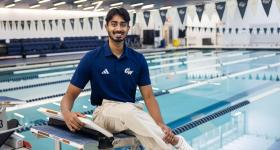
Champion Swimmer Dives into Nutrition Platform
Senior psychology major and A-10 champion swimmer Ganesh Sivaramakrishnan launched PowerPlatez, an app designed to help busy people eat smarter while saving time and money.
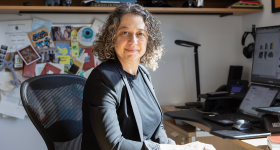
Imagine That: Professor Pictures Unique Mind’s Eye
Psychology’s Sarah Shomstein was skeptical of aphantasia, a phenomenon where people lack mental imagery. Then she looked inside her own head.
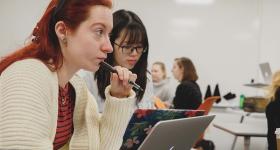
New CCAS Graduate Degrees Expand Advanced Learning Opportunities
Starting Fall 2025, the new M.S. in applied psychology teaches students how to use psychological theory and methods to inform and improve real-world operations and outcomes.

Budding Entrepreneurs Win Cash Prizes at 2024 New Venture Competition
Sofia Bertini, BA'24, and her group won first place for the Consumer Goods and Services Track, in addition to the Best Market Assessment specialty prize, winning $15,000.

Alumna and POPSUGAR founder Lisa Sugar, B.A. ’98, pivots to funding—to power the future of commerce.

2023 Student Speaker Is Psychology Minor Giselle Elisa Garcia
Columbian College of Arts & Sciences student Giselle Elisa Garcia will deliver the student address at Commencement in May.
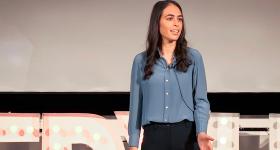
Fear of Failing: The Secrets Behind Social Anxiety
For the 40 million Americans with social anxiety disorder, even casual encounters can be paralyzing. Psychology’s Fallon Goodman helps them make connections.
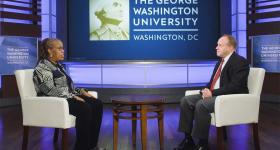
Addressing Suicide Risks Among Black Youths: A Conversation with Associate Professor of Clinical Psychology Sherry Molock
